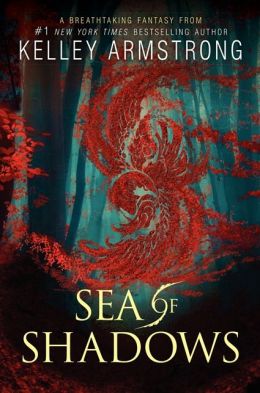Kelley Armstrong has a history of writing entertaining novels, from her long-running Women of the Otherworld series to her moderately well-received Darkest Powers/Cainsville and Darkness Rising Young Adult trilogies. Sea of Shadows marks the start of a new trilogy aimed at the YA market.
To the best of my knowledge, it also marks the first time Armstrong has written a novel entirely in a second-world setting: where her other works are working within the urban/contemporary fantasy subgenre, Sea of Shadows takes its inspiration from the epic fantasy tradition.
It’s a comfortably familiar sort of tradition, and I’m almost surprised to see Sea of Shadows emerge from a YA imprint (HarperTeen in the US, Atom in the UK). Its lineaments are reminiscent of the kind of second-world fantasy that’s long been associated with, for example, DAW Books: reading it, I was reminded not a little of the mood of Tanya Huff’s Four Quarters novels, for example, or the tone of Sherwood Smith’s Inda; perhaps somewhat of Kristen Britain’s Green Rider. It is difficult, therefore, to assess Sea of Shadows in terms of its intended audience when it follows similar conventions, and employs a similar emotional palette, to works which don’t market themselves as explicitly for Young Adults.
I’ve said it before, and I’ll repeat myself here, that the hallmark of Young Adult novels is usually their heightened emotional intensity: an emotional intensity often dismissed under the rubric of angst, but one that’s a core component of the adolescent experience, and thus of YA fiction. Sea of Shadows doesn’t bring this high-strung emotional pitch to its execution. And so I feel that comparing it to the YA field in YA terms does it a disservice, when its emotional palette has more points of comparison with the wider field of fantasy.
The shorter version: It’s more like fantasy that predates YA-as-a-category than it is like YA.
Youthful twin sisters Moria and Ashyn are respectively the Keeper and the Seeker of Edgewood, a village on the edge of the empire in which they live. Edgewood is separated from rest of civilisation by a wasteland of volcanic rock. It is also the last village before the Forest of the Dead, a dire forest haunted by spirits and other dangerous supernatural creatures. The empire exiles its criminals to the Forest of the Dead, and no exile has ever returned. It is Moria and Ashyn’s task to protect their village from the spirits; and it is about to become Ashyn’s task to go into the Forest once a year, find the bodies of the dead exiles, and lay their spirits to rest. This year is the first year Ashyn has been old enough to be sent to that duty, and the first year that both twins do not have the presence of older mentors—so, naturally, it’s the first year that everything goes wrong.
Supernatural creatures slaughter their entire village, apart from the children. The children are taken—in the direction away from the Forest. Separated, the twins have to make their way across the wasteland to the nearest outpost of civilisation: a wasteland suddenly plagued by creatures out of myth. Moria is alone save for Gavril, a young warrior whose father, once a marshal of the empire, was exiled into the Forest of the Dead; Ashyn has only Ronan, a young exile who has survived the Forest, to help her.
But when they, separately, reach the next village on the road to civilisation, they discover that danger has gone before them. To keep the children of Edgewood alive, they have to take a message to the emperor: a message that will set the empire at war.
Sea of Shadows is an entertaining book, but not a particularly driven one (nor a particularly diverse one). Armstrong is at her best with character beats—each of the four major characters are strongly delineated as individuals—and with action scenes. There are some pretty solid action scenes with interesting monsters.
In terms of pacing, however, it’s on the uneven side: there’s a lot of time spent on set-up, particularly at the beginning, before the slaughter of the village; and then again in the period after Ashyn reaches the next village on the road but before Moria has. Structurally, the narrative feels off balance: sections are spent alternately with Moria and with Ashyn, but instead of building the tension through the interplay of these sections in an organic way, at times the narrative structure feels as though it’s working against itself. While romance is not put very strongly forward, the pairing-off of our two main female characters with a boy each does strike me as a little on the unimaginative side: the reader is clearly intended to form Expectations for their relationships.
There is also one interlude, after both young women and both young men are travelling in concert, that involves Ashyn being kidnapped—briefly—by slave traders who want to sell her to a foreign king’s harem. This interlude may or may not be setting something up for a later volume, but it does very little for the book here—and I can’t be alone in finding the kidnapped-for-a-harem subplot both problematic and groanworthy, can I?
Sea of Shadows isn’t a novel that stirs very strong feelings in me. It feels solidly middle-range fantasy, working the same vein of the epic tradition tapped by Jim Butcher with his Codex Alera: doing a decent job with its material, but not strikingly ambitious. I don’t regret reading it, but I’m not going to go out of the way to look for the sequel.
Which is a pity, because I wanted to like it a lot more than I did.
Sea of Shadows is available now from HarperTeen (US) and Atom Books (UK).
Liz Bourke is a cranky person who reads books. Her blog. Her Twitter.










